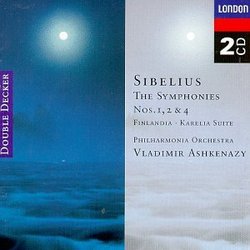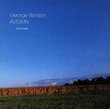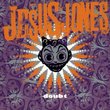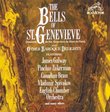| All Artists: Jean Sibelius, Vladimir Ashkenazy, Philharmonia Orchestra of London Title: Sibelius: Finlandia/Karelia Suite/The Symphonies Nos. 1, 2 & 4 Members Wishing: 1 Total Copies: 1 Label: Decca Release Date: 1/13/1998 Genre: Classical Styles: Forms & Genres, Theatrical, Incidental & Program Music, Historical Periods, Modern, 20th, & 21st Century, Symphonies Number of Discs: 2 SwapaCD Credits: 2 UPC: 028945540221 |
Search - Jean Sibelius, Vladimir Ashkenazy, Philharmonia Orchestra of London :: Sibelius: Finlandia/Karelia Suite/The Symphonies Nos. 1, 2 & 4
 | Jean Sibelius, Vladimir Ashkenazy, Philharmonia Orchestra of London Sibelius: Finlandia/Karelia Suite/The Symphonies Nos. 1, 2 & 4 Genre: Classical
![header=[] body=[This CD is available to be requested as disc only.]](/images/attributes/disc.png?v=15401716) ![header=[] body=[This CD is available to be requested with the disc and back insert.]](/images/attributes/disc_back.png?v=15401716) ![header=[] body=[This CD is unavailable to be requested with the disc and front insert at this time.]](/images/attributes/greyed_disc_front.png?v=15401716) ![header=[] body=[This CD is unavailable to be requested with the disc, front and back inserts at this time.]](/images/attributes/greyed_disc_front_back.png?v=15401716) |
Larger Image |
CD DetailsSimilarly Requested CDs
|
CD ReviewsGood, sometimes great Sibelius Richard A. Cavalla | NJ, USA | 05/07/2000 (4 out of 5 stars) "Ashkenazy is not the greatest Sibelius conductor around, but he has moments of brilliance, and he is aided by a great orchestra and great sound. You could, however, make a case for the interpretation being too "warm" to fully suit Sibelius. While I think this true in parts, it writes off Ashkenazy too easily. Symphony No. 1 is good, with a strong sense of rhythm and well-defined counterpoint. It is let down in places by sappy, ultra-romantic string playing, particularly in the first and last movements. Symphony No. 2, which was composed in a similar style to No.1, fares better. The details of the music come through vividly, but the string playing is not overdone. The "big tune" in the last movement is truly stirring and engaging. Symphony No. 4, probably the bleakest and coolest of Sibelius' symphonies, is more successful than the 1st but not as successful as the 2nd. There is just that extra degree of tension missing. The set is filled out by two of Sibelius' shorter orchestral works - the Karelia Suite and the ever-popular Finlandia. The Finlandia is superb, one of the best recordings ever. The brass really bite, and Ashkenazy conveys the patriotic furvor that made the Russian authorities of the time ban the work. The Karelia Suite goes from charming to exciting to beautiful without missing a step. The ballade section is absolutely gorgeous. In conclusion, I would not want these to be my only Sibelius recordings, but there is still lots of good stuff here. Worth checking out." Top Recommendation drdolores | 08/09/2001 (5 out of 5 stars) "Sibelius' symphonies have often been represented as austere and sparsely-textured works, and this is in many ways true. However, at heart, and behind the 'profound logic' which pervades these exsquisitely structured masterpieces, Sibelius was at heart a romantic. These recordings from Ashkenazy, along with his readings of the Rachmaninov symphonies, are perhaps his most successful in the role of conductor. He approaches them from a different perspective to, say, Rattle or Sir Alexander Gibson (with the SNO on Chandos, and also thoroughly recommendable in his own right), infusing the music with a greater sense of expressive warmth, in addition to his powerful control of structure and almost flawless choice of tempi. Reservations are few and far between. Perhaps Ashkenazy allows a bit much passionate ardour into the great climaxes of the highly romantic first symphony, but this may not seem inappropriate to all listeners. Along with the earlier cycle from Colin Davis with the Boston Symphony (also available on two double cd sets from Philips), a firm recommendation."
|

 Track Listings (8) - Disc #1
Track Listings (8) - Disc #1







